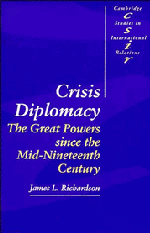2 - Theories of crisis behaviour
Published online by Cambridge University Press: 03 May 2011
Summary
The discussion of international crises reflects a bewildering kaleidoscope of theories. In public comment and even in policy making these may remain at the level of assumption, but one of the tasks of social science is to articulate the theories which underlie such assumptions. The aim of this chapter is to identify the most significant theories for the understanding of international crises – those which, in the light bf previous research, still need to be taken into account – and the extent of their incompatibility or complementarity. ‘Understanding’ is used here to refer to the role of concepts in description as well as explanation, providing a theoretical language as well as a set of hypotheses. Initially, however, in view of the looseness with which the term is often used, it is necessary to formulate a definition of ‘crisis’ which is appropriate to the present study.
The definition of ‘crisis’
The term has been used in such varied ways by social scientists, historians and commentators that a common definition appears unattainable. It is necessary to find one which is appropriate to the particular subject matter, and for the most part, this is what students of international crises have attempted. Even so, they have offered several different types of definition. In particular, crises have been defined in terms of abrupt systemic change, a certain class of decisions or a high risk of war, with a tendency to converge on the third of these.
- Type
- Chapter
- Information
- Crisis DiplomacyThe Great Powers since the Mid-Nineteenth Century, pp. 10 - 24Publisher: Cambridge University PressPrint publication year: 1994

